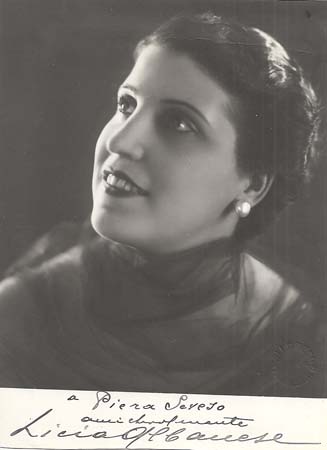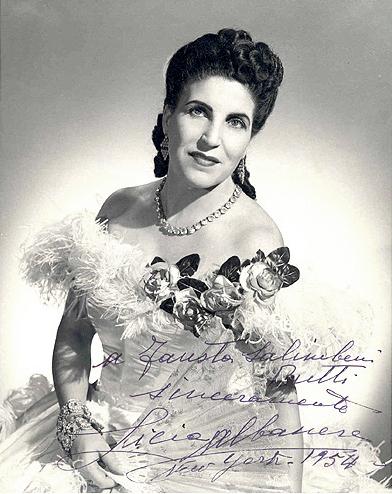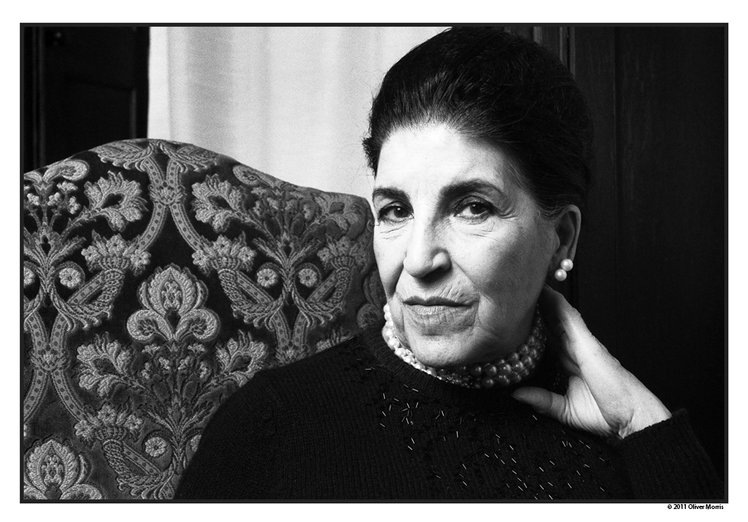A Conversation with Bruce Duffie


 LA: I have to look at the
role. Even maestro Merola asked me to sing Tosca. I said, "Let's wait a
little more for Tosca.
She's very, very
dramatic in action, not vocally because
if you have high notes, the second act's okay. If you
don't have it you scream, and that's terrible. [Laughter]
The most dramatic thing is in the duet
with Scarpia, and it is dramatic even to the last touch, and later to
describe again what she did with Scarpia when she killed him.
Usually they don't make all the same reactions
like they did in second act. When you see a movie and then
somebody tells you the story, they come in and tell you what
happened. So I used to do that the last act of Tosca this
way. I did the same staging, the same movements I did when I
killed Scarpia to show Mario what I did. That becomes
dramatic, too. But I think the dramatic comes when you really not
just push the voice, because then
the voice stops; it doesn't go on to the audience. It
isn't just to have this kind of beautiful shining voice; it must
project. We had so many artists that had voices that were smaller
than mine — Schipa, for
example, or Cesare Valletti, or Gigli.
They were lyric. Cesare Valletti and Schipa were leggiero, light,
and you could hear those voices even at the back of the opera.
That means they never pushed; they just left the voice floating.
That's what
I tell to the young people when I see them, "Why don't you
make your voice float in the theater?" Not to do [vocalizes in a
coarse, constricted, and unsophisticatedly undulating tone] "Uhhhhhh,"
where you push and you keep the breath in the
back. Instead, the breath should come out. You need to
do [demonstrates singing in a light, relaxed tone of voice]
"Ahhhhh." [Demonstrates the same thing, starting
more softly and gradually increasing in volume]
"Ahhhhhhhhhhhhh." This goes because the note is on the
breath. I don't see them because I don't teach; I try to
teach, but I couldn't. I want to be free. I need to do a
lot of things. I don't know if you heard, I sang the Follies
here in New York two years ago, and then I sang it in Houston for a
month. I was there the month of June, and they enjoyed it so much.
LA: I have to look at the
role. Even maestro Merola asked me to sing Tosca. I said, "Let's wait a
little more for Tosca.
She's very, very
dramatic in action, not vocally because
if you have high notes, the second act's okay. If you
don't have it you scream, and that's terrible. [Laughter]
The most dramatic thing is in the duet
with Scarpia, and it is dramatic even to the last touch, and later to
describe again what she did with Scarpia when she killed him.
Usually they don't make all the same reactions
like they did in second act. When you see a movie and then
somebody tells you the story, they come in and tell you what
happened. So I used to do that the last act of Tosca this
way. I did the same staging, the same movements I did when I
killed Scarpia to show Mario what I did. That becomes
dramatic, too. But I think the dramatic comes when you really not
just push the voice, because then
the voice stops; it doesn't go on to the audience. It
isn't just to have this kind of beautiful shining voice; it must
project. We had so many artists that had voices that were smaller
than mine — Schipa, for
example, or Cesare Valletti, or Gigli.
They were lyric. Cesare Valletti and Schipa were leggiero, light,
and you could hear those voices even at the back of the opera.
That means they never pushed; they just left the voice floating.
That's what
I tell to the young people when I see them, "Why don't you
make your voice float in the theater?" Not to do [vocalizes in a
coarse, constricted, and unsophisticatedly undulating tone] "Uhhhhhh,"
where you push and you keep the breath in the
back. Instead, the breath should come out. You need to
do [demonstrates singing in a light, relaxed tone of voice]
"Ahhhhh." [Demonstrates the same thing, starting
more softly and gradually increasing in volume]
"Ahhhhhhhhhhhhh." This goes because the note is on the
breath. I don't see them because I don't teach; I try to
teach, but I couldn't. I want to be free. I need to do a
lot of things. I don't know if you heard, I sang the Follies
here in New York two years ago, and then I sang it in Houston for a
month. I was there the month of June, and they enjoyed it so much. LA: First I read the
book, if there is a book, of the opera that I always sing. When I
did Donna Anna or Nozze di Figaro,
we have books of these
beautiful roles. With Manon, I read the book. I find the
Manon of Massenet very
French, elegant like a powder puff. [Chuckles] When
I study the Puccini, Puccini was Puccini, dramatic
and Italian. But I read the book and I found out very much.
For instance, des Grieux was a very, very stubborn man! This is
like a Sicilian mind, like where I
come from in Southern Italy! Very,
very stubborn. I find out the two operas had the
same thing — light and then dramatic. In
Manon
of Massenet, you cannot put something dramatic like Puccini did in
the last act with "Sola, perduta,
abbandonata." This is a heavy,
beautiful aria. That's the
difference. The Massenet opera is very light, very chic, but both
of them are beautiful.
LA: First I read the
book, if there is a book, of the opera that I always sing. When I
did Donna Anna or Nozze di Figaro,
we have books of these
beautiful roles. With Manon, I read the book. I find the
Manon of Massenet very
French, elegant like a powder puff. [Chuckles] When
I study the Puccini, Puccini was Puccini, dramatic
and Italian. But I read the book and I found out very much.
For instance, des Grieux was a very, very stubborn man! This is
like a Sicilian mind, like where I
come from in Southern Italy! Very,
very stubborn. I find out the two operas had the
same thing — light and then dramatic. In
Manon
of Massenet, you cannot put something dramatic like Puccini did in
the last act with "Sola, perduta,
abbandonata." This is a heavy,
beautiful aria. That's the
difference. The Massenet opera is very light, very chic, but both
of them are beautiful.| Italian soprano. Born July 22,
1913, in Bari, Italy; m. Joseph Gimma (Italian-American businessman),
1945; studied with Emanuel De Rosa in Bari and Giuseppina
Baldassare-Tedeschi in Milan. At 22, won 1st Italian government-sponsored vocal competition in a field of 300 entrants; in 1st five years of career, sang at Teatro alla Scala, Covent Garden, and the Rome Opera; when Benito Mussolini would no longer let distinguished Italian artists leave the country, escaped to Portugal (1939) and boarded ship bound for US; debuted at Metropolitan Opera (Feb 9, 1940) as Cio-Cio-San; was perhaps the most famous La Boheme Mimi of the 1940s; made final Metropolitan Opera performance (1966); received the Lady Grand Cross of the Equestrian Order of the Holy Sepulchre from Pope Pius XII; after retirement, worked for Puccini Foundation, founded by husband, to further survival of opera as art form; awarded President’s Medal by Bill Clinton for work in the arts (1995). ======== Albanese was one of the most beloved sopranos in the Italian repertoire, specializing in roles that suited her physical and vocal appearances of vulnerability and delicacy. She specialized in Puccini, and was associated with his Madama Butterfly more than with any other role. Her vocal and dramatic intensity and sense of apt staging made her performances riveting. She first studied piano, but switched her energies to voice, studying with Giuseppina Baldassare-Tedeschi. She won the Italian National Singing Competition in 1933, and her opera debut, as Butterfly, was as a mid-opera last-minute substitute for an ailing colleague at the Teatro Lirico in Milan, in 1934. Her La Scala debut was in 1935 as Lauretta in Puccini's Gianni Schicchi, her Covent Garden debut as Liu in Turandot, and her Met debut was in 1940 as Butterfly, beginning an association with that house that lasted until 1966. She made the occasional forays into heavier repertoire during her career, even experimenting with the role of Elsa in Lohengrin in her early years in Italy, but rarely added such roles to her repertoire, and being careful with her performances of even such medium-weight roles as Tosca. Towards the end of her career, she performed heavier roles such as Aida. After her retirement, she remained active, leading the Puccini Foundation (which she and her husband created), teaching master classes at the Juilliard School of Music and Marymount Manhattan College, and directing operatic scenes. In 1985 and 1987, she made cameo appearances in Steven Sondheim's Follies. In 2000, she received the Handel Medallion. The honor, which was bestowed upon her by Mayor Rudolph W. Giuliani, is a tribute to individuals who have enriched New York City's cultural life. |
This interview was recorded on the telephone on
February 26, 1988. A portion was published in The Massenet Newsletter in July,
1989, and
other sections were used (along with recordings) on WNIB in 1998.
It was fully transcribed, re-edited and posted on this
website in 2012.
To see a full list (with links) of interviews which have been
transcribed and posted on this website, click here.
Award - winning broadcaster Bruce Duffie was with WNIB, Classical 97 in Chicago from 1975 until its final moment as a classical station in February of 2001. His interviews have also appeared in various magazines and journals since 1980, and he now continues his broadcast series on WNUR-FM, as well as on Contemporary Classical Internet Radio.
You are invited to visit his website for more information about his work, including selected transcripts of other interviews, plus a full list of his guests. He would also like to call your attention to the photos and information about his grandfather, who was a pioneer in the automotive field more than a century ago. You may also send him E-Mail with comments, questions and suggestions.